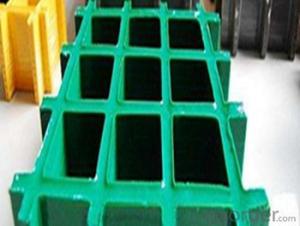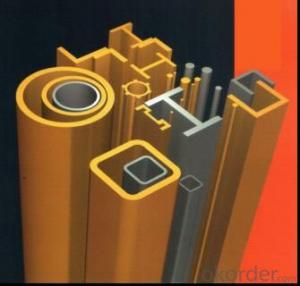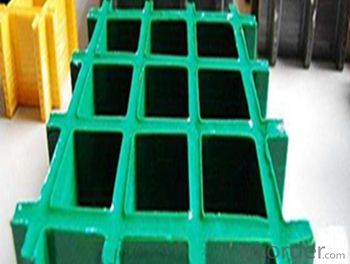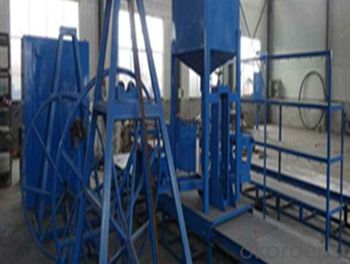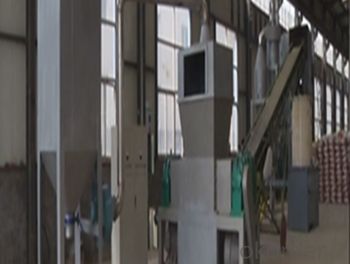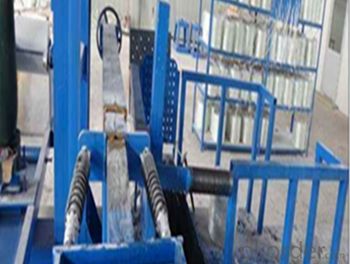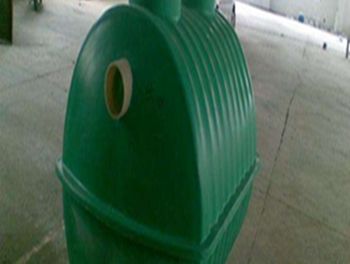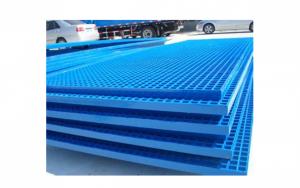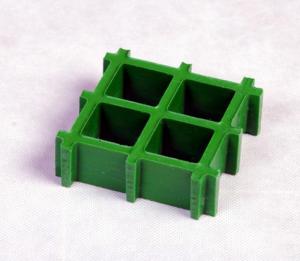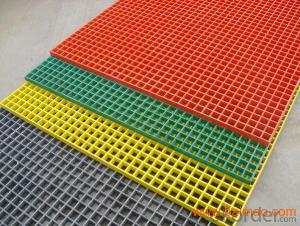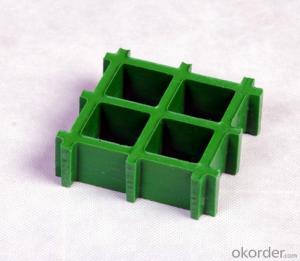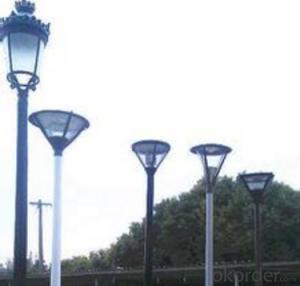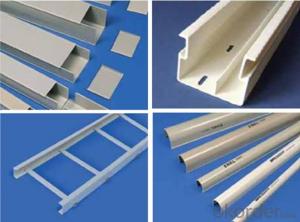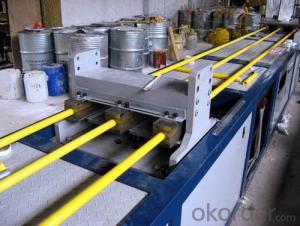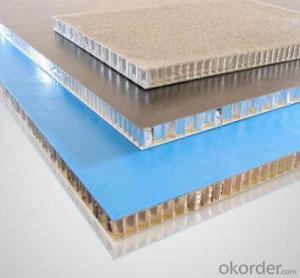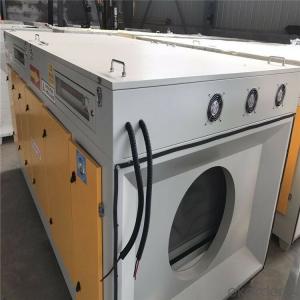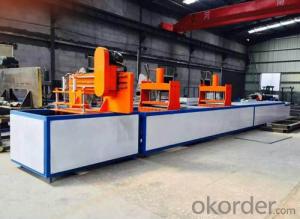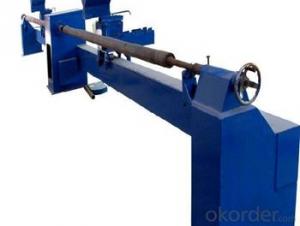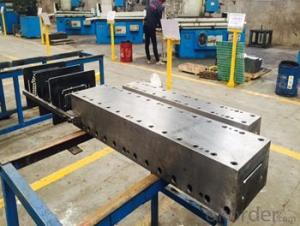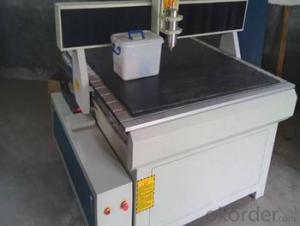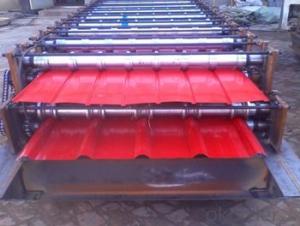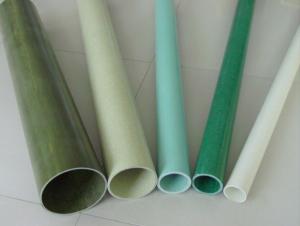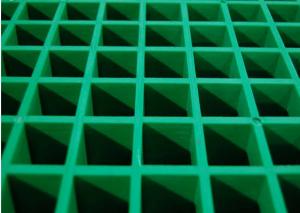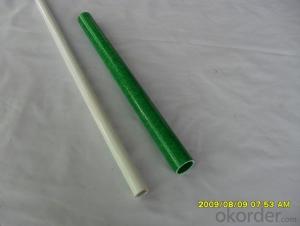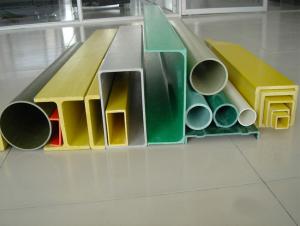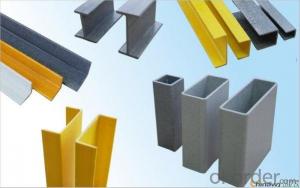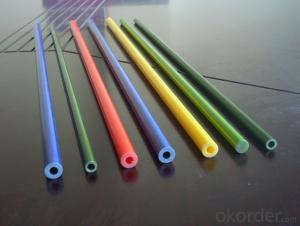FRP Pultrusion Profiles - Safe, Anti-Slip, High-Quality FRP Pultruded Grating
- Loading Port:
- Tianjin
- Payment Terms:
- TT OR LC
- Min Order Qty:
- 20000 m.t.
- Supply Capability:
- 300000 m.t./month
OKorder Service Pledge
OKorder Financial Service
You Might Also Like
Specification
PRODUCT DESCRIPTION
Pultruded grating is made by a particular assembly process, which using “I” shape as its main load-bearing and special rod to go through the bearing bar. Pultruded grating include the standard grating and the custom grating, the custom grating can be designed to meet customer’s requirement or special using condition by changing the shape, size and space of the bearing bars, the surface can be covered with lozenge panel, grit panel, or added the anti-slippery sand directly.
FRP pultruded grating has the most characteristics of molded grating, but it has its distinct advantages, it has very high fiberglass content in the loading direction, so it has very high load capability, it has more superiority when used at wide span, so that the basic support will be decreased and the project cost will be reduced accordingly.
SPECIFICATION
The standard space between two crossbars is 6 inch or 12 inch.
Thickness (mm) | Bar width (mm) | Open space (mm) | Open rate (%) | Approx weight (kg/m |
25.4 | 15.2 | 22.8 | 60 | 13.2 |
25.4 | 15.2 | 15.2 | 50 | 15.9 |
25.4 | 15.2 | 10.1 | 40 | 18.5 |
25.4 | 40 | 10.8 | 21 | 14.5 |
38.1 | 15.2 | 22.8 | 60 | 15.8 |
38.1 | 15.2 | 15.2 | 50 | 19.1 |
38.1 | 15.2 | 10.1 | 40 | 22.4 |
50.8 | 25.4 | 25.4 | 50 | 16.6 |
50.8 | 25.4 | 12.7 | 33 | 21.1 |
CHOICE FOR PULTRUDED GRATING
Resin: GP resin, ISO resin, VE resin, Phenol resin
Color choice: Yellow, gray, green, custom color
Surface choice: Groove surface, grit surface, lozenge cover surface
FEATURES
a. Anti-corrosion and anti-rust
b. Light weight and high strength
c. Anti-flammable
d. Anti- fatigue
e. Safe and anti-slippery
f. Anti-ageing
g. Easy of maintenance
h. Excellent electromagnetism property
i. Good economic benefit
APPLICATION
Operation terrace,
stair walkway,
ground floor,
trench cover,
sidewalk,
foot bridge,
equipment safety fence,
scaffold.
COMPANT DESCRIPTION
CNBM,China National Building Materials Group is a state-owned enterprise in charge of administrative affairs in china building materials industry. Established in 1984, CNBM is a large group corporation of building materials with total assets of 25 billion RMB and a total staff of 30,000.CNBM now owns 200 subordinating firms of solely owned and joint-venture companies.
CNBM International Corporation is one subsidiary of CNBM, we focus on offering good-quality products,professional service and complete solution to our customers. Strong delivery capacity, advanced technology& management, strong financing capability and excellent after-sale service are our advantages in sharing international market.
FAQ
Q1.What's your sample policy?
A:We can supply the sample if we have ready parts in stock, but the customers have to pay the courier cost.
Q2.Can you produce according to the samples?
A: Yes, we can produce or modify the products according to your request.
Q3.How do you deliver the goods to my country?
A:We can provide international express, such as DHL, EMS, UPS, FedEx, etc. We select air freight and sea freight upon your requests. Quotations if without mentioning the shipping costs are shipping fee excluded.
Q4.How much does it cost to ship to my country?
A:When you goanna to place an order, please contact us, because different country has different freight.
Q5.How to get the catalogue?
A:please contact us and tell us what you are looking for.
We will try our best to meet customers' demands. Welcome you come here to visit us. We sincerely welcome partners around the world to establish business cooperation with us on the basis of mutual trust, benefit and development.
PICTURES
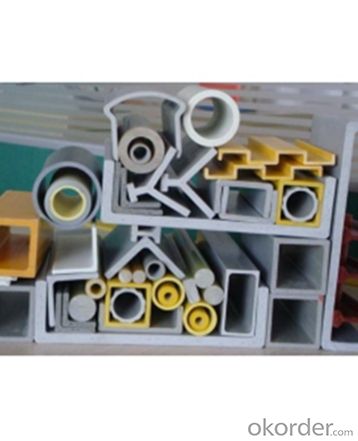
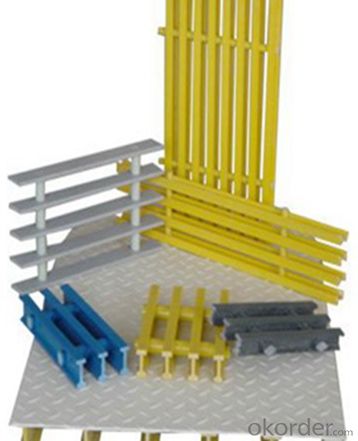
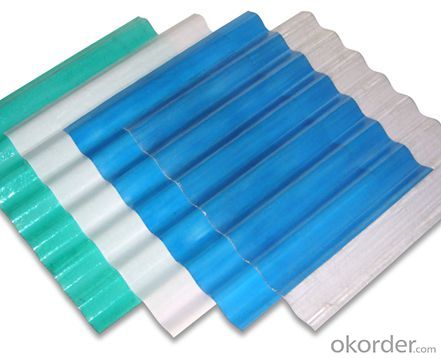
- Q: Are FRP pultrusion profiles resistant to moisture or humidity?
- Yes, FRP pultrusion profiles are highly resistant to moisture and humidity. The combination of fiberglass reinforcement and resin matrix used in their construction makes them non-corrosive and impervious to water absorption. This inherent resistance ensures their durability and performance in humid or moist environments without compromising their structural integrity.
- Q: How do FRP pultrusion profiles handle cyclic loading?
- FRP pultrusion profiles are known for their excellent resistance to cyclic loading. The combination of the fiber reinforcement and the resin matrix in the pultrusion process results in a highly durable and fatigue-resistant material. The inherent strength and stiffness of the fibers help to distribute the applied loads evenly, while the resin matrix absorbs and dissipates the energy from cyclic loading, preventing crack propagation and failure. This makes FRP pultrusion profiles a reliable choice for applications that involve repeated or fluctuating loads.
- Q: Can FRP profiles replace carbon steel profiles?
- I am a man of glass fiber reinforced material. Honestly, "I can't do it."". Can be used in buildings, such as insulation, corrosion protection, aging resistance, flame retardant, etc.,
- Q: Can FRP pultrusion profiles be used in the construction of conveyor systems?
- FRP pultrusion profiles are highly effective in the construction of conveyor systems. They offer numerous advantages that make them suitable for this purpose. To begin with, these profiles are both lightweight and strong, making them ideal for constructing conveyor systems. Their high strength-to-weight ratio allows for easy installation and maintenance, reducing the overall weight of the system while maintaining structural integrity. This is particularly beneficial when designing and building long-span conveyor systems. Additionally, FRP pultrusion profiles are highly resistant to corrosion. Unlike traditional materials such as steel or aluminum, they do not rust or deteriorate when exposed to chemicals or moisture. This resistance makes them particularly suitable for conveyor systems that may be subjected to harsh environments or corrosive substances, such as those found in the mining or chemical industries. Another advantage of FRP pultrusion profiles is their excellent electrical insulation properties. They do not conduct electricity, which is essential in conveyor systems where electrical components are present. This property ensures a higher level of safety and reduces the risk of electrical hazards. Furthermore, these profiles can be easily customized to meet specific design requirements. They can be manufactured in various shapes and sizes, providing flexibility in conveyor system design. Additionally, they can incorporate features such as channels, slots, or reinforcements, which can be advantageous for mounting accessories or facilitating the movement of goods on the conveyor. Lastly, FRP pultrusion profiles are highly durable and have a long service life. They are resistant to UV degradation and do not require frequent maintenance or painting, resulting in reduced lifecycle costs compared to traditional materials. This durability makes them a cost-effective choice for constructing conveyor systems. In conclusion, FRP pultrusion profiles are an excellent option for constructing conveyor systems. Their lightweight nature, corrosion resistance, electrical insulation properties, customization options, and durability make them a reliable and efficient material for this application.
- Q: Are FRP pultrusion profiles resistant to chemicals used in agricultural applications?
- Yes, FRP (Fiber Reinforced Polymer) pultrusion profiles are highly resistant to chemicals used in agricultural applications. FRP pultrusion profiles are made from a combination of reinforced fibers and a polymer resin matrix, typically polyester or vinyl ester. These materials provide excellent resistance to a wide range of chemicals commonly used in agriculture, such as fertilizers, pesticides, herbicides, and various acids. The inherent corrosion resistance of FRP pultrusion profiles makes them a preferred choice in agricultural applications where exposure to chemicals is common. Unlike traditional materials like wood, steel, or concrete, FRP profiles do not deteriorate or degrade when exposed to aggressive chemicals. This resistance ensures that the profiles maintain their structural integrity and performance over a long lifespan, even under harsh agricultural conditions. Furthermore, FRP pultrusion profiles offer superior resistance to corrosion, moisture, UV radiation, and temperature fluctuations. These properties make them highly durable and suitable for a wide range of agricultural applications, including structural supports, fencing, grating, decking, and irrigation systems. It is important to note that while FRP pultrusion profiles are highly resistant to chemicals, they may still experience some level of degradation or staining when exposed to extremely concentrated or highly aggressive chemicals. Therefore, it is recommended to consult with the manufacturer or supplier to ensure that the specific chemicals used in the agricultural application are compatible with the chosen FRP pultrusion profiles.
- Q: Are FRP pultrusion profiles resistant to vibration or shock?
- FRP pultrusion profiles are highly resistant to vibration and shock. The inherent properties of FRP (Fiber Reinforced Polymer) materials make them ideal for applications requiring durability and strength under dynamic loading conditions. The composition of FRP profiles, which typically include a combination of reinforcing fibers and a resin matrix, provides excellent stiffness and damping characteristics. This enables FRP pultrusion profiles to effectively absorb and dissipate vibrations and shock forces, preventing damage or degradation. Additionally, the design flexibility of FRP allows for tailored reinforcement and optimization, further enhancing its resistance to vibration and shock. Therefore, FRP pultrusion profiles are a reliable choice for applications where these properties are crucial, such as in aerospace, automotive, marine, and structural engineering industries.
- Q: Can FRP pultrusion profiles be used in the construction of theme park rides?
- Yes, FRP (Fiber Reinforced Polymer) pultrusion profiles can be used in the construction of theme park rides. FRP pultrusion profiles offer several advantages that make them suitable for this application. Firstly, FRP pultrusion profiles are lightweight yet strong, making them ideal for constructing ride structures that need to withstand dynamic loads and forces. Their high strength-to-weight ratio allows for the creation of large, complex structures that can support the weight of riders and withstand the forces generated during operation. Additionally, FRP pultrusion profiles are corrosion-resistant, which is crucial for theme park rides that are often exposed to outdoor environments, including moisture, chemicals, and UV radiation. This corrosion resistance ensures that the ride structures remain durable and safe over their lifespan, reducing the need for costly maintenance and repairs. Another advantage of FRP pultrusion profiles is their design flexibility. They can be easily molded into various shapes and sizes to meet the specific requirements of theme park ride designs. This versatility allows for the creation of unique and visually appealing ride structures that enhance the overall experience for park visitors. Furthermore, FRP pultrusion profiles offer excellent electrical insulation properties, which can be essential for rides that involve electrical components or systems. This insulation helps to minimize the risk of electrical hazards and ensures the safety of riders and operators. In conclusion, FRP pultrusion profiles are well-suited for the construction of theme park rides due to their lightweight, high strength, corrosion resistance, design flexibility, and electrical insulation properties. These profiles can contribute to the development of safe, durable, and visually appealing ride structures that enhance the enjoyment and excitement of theme park visitors.
- Q: Are FRP pultrusion profiles UV resistant?
- FRP pultrusion profiles are known for their UV resistance. This is because manufacturers use a combination of polymer resin and reinforced fibers, like fiberglass, to create these profiles. These materials naturally possess UV resistant properties, which means that FRP pultrusion profiles can withstand prolonged exposure to sunlight and ultraviolet radiation without getting damaged. For outdoor applications, such as in construction, infrastructure, and marine industries, UV resistance is an important characteristic. However, it's worth noting that the level of UV resistance can vary depending on the specific resin and fiber composition used in the manufacturing process. To get precise information about the UV resistance of FRP pultrusion profiles for a specific application, it's advisable to consult the manufacturer or supplier.
- Q: Do FRP pultrusion profiles have any limitations or drawbacks?
- FRP pultrusion profiles indeed have certain limitations and drawbacks that need to be taken into account. One of these limitations is their lower stiffness compared to traditional materials like steel or aluminum. As a result, they may not be suitable for applications that demand high structural rigidity or heavy loads. Another constraint is their susceptibility to creep, which refers to the gradual deformation of the material under a constant load over time. This can adversely affect the long-term performance and durability of the profiles, particularly in scenarios where they face sustained stress. Moreover, FRP pultrusion profiles generally incur higher production costs compared to traditional materials. The manufacturing process involves pultruding continuous fibers through a resin matrix, requiring specialized equipment and expertise. Consequently, the higher production expenses make FRP pultrusion profiles less economically viable for certain applications. Additionally, FRP pultrusion profiles are typically not suitable for high-temperature applications. The resin matrix used in their production can degrade or soften at elevated temperatures, thereby restricting their use in environments where thermal resistance is crucial. Finally, FRP pultrusion profiles may have limited design flexibility compared to other materials. The pultrusion process typically yields profiles with constant cross-sections and limited geometric complexity. Consequently, their use is restricted in applications that necessitate intricate shapes or customized designs. Despite these limitations, FRP pultrusion profiles offer several advantages, such as a high strength-to-weight ratio, corrosion resistance, and electrical insulation properties. Therefore, it is crucial to thoroughly consider the specific requirements of the application before opting for FRP pultrusion profiles.
- Q: What types of materials are commonly used in FRP pultrusion?
- Commonly used materials in FRP pultrusion include fiberglass, polyester resin, vinyl ester resin, epoxy resin, carbon fiber, and aramid fiber.
Send your message to us
FRP Pultrusion Profiles - Safe, Anti-Slip, High-Quality FRP Pultruded Grating
- Loading Port:
- Tianjin
- Payment Terms:
- TT OR LC
- Min Order Qty:
- 20000 m.t.
- Supply Capability:
- 300000 m.t./month
OKorder Service Pledge
OKorder Financial Service
Similar products
Hot products
Hot Searches
Related keywords
